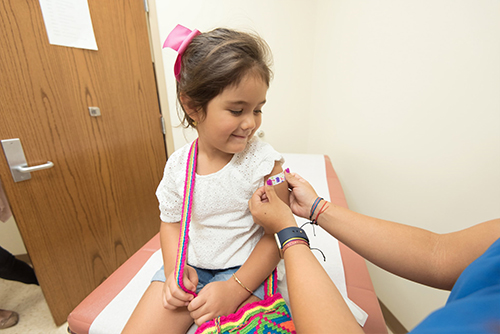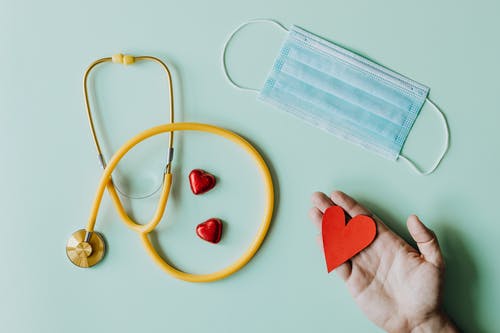School Health Services
School health service professionals play a critical role in providing everyday care for our students. The school health team typically consists of the school physician, school nurse(s), and health assistants working in partnership with the student, their parents and caregivers, and the student’s primary healthcare provider(s). Whether conducting routine screenings; responding to injuries, illnesses, or emergencies; providing referrals or care coordination; or assisting with family outreach and health counseling and education, school health services staff work together to ensure that all students are healthy and ready to learn.
Regulations
Legislation
Emergency Administration of Opioid Antidote
Epinephrine
Medically Fragile Law
- P.L. 2012, c. 5 - Establishes standards of practice for providers of clinical nursing services for medically fragile students.
- Resolution to Adopt the Department of Human Services Directory of Clinical Nursing Service Providers for Medically Fragile Students
- Approved Providers list per P.L. 2012, c. 5 at NJMMIS
(Select “Home Care Provider” under Provider Type or “Home Health Agency” under Provider Specialty.)
Medical Marijuana Law, P.L. 2015, c. 158
Opioid Information for Parents and Student-Athletes
Paul's Law
Sudden Cardiac Arrest
Annual Distribution of the Meningitis Fact Sheet
N.J.S.A. 18A:40-21.2 requires that school districts annually distribute the educational factsheet on meningitis to parents or guardians of students entering sixth grade. The fact sheet is also available to private schools, although they are encouraged, but not required, to distribute.
Annual Distribution of Fact Sheet on Human Papillomavirus (HPV)
N.J.S.A. 18A:40-42 requires public schools to annually distribute a fact sheet to parents or guardians of students in grade seven about the causes, symptoms and means of transmission of HPV, and where additional information can be obtained. The distribution of either the fact sheet about vaccination against HPV and/or HPV vaccine information for parents is acceptable. Private schools are encouraged, but not required, to distribute the fact sheet.
Annual In-Service About Asthma
N.J.S.A. 18A:40-12.9 requires annual asthma education opportunities for teaching staff. The American Lung Association offers free online training opportunities and resources. The certified school nurse shall receive training in airway management and in the use of nebulizers and inhalers consistent with nationally recognized standards including, but not limited to, those of the National Institutes of Health and the American Academy of Allergy, Asthma, and Immunology.
Annual In-Service About Blood Borne Pathogens
Federal Occupational Safety and Health regulations require annual in-service training for school staff. N.J.A.C. 8:61-2 (New Jersey Department of Health regulations) require public and nonpublic schools and daycare facilities to establish policies and procedures for handling blood and bodily fluids, and policies and procedures for post-exposure management. Schools and daycare facilities are required to provide training and appropriate supplies for all school personnel.
Annual In-Service on Alcohol, Tobacco, and Other Drug Abuse Prevention
All educational staff members shall receive in-service training in alcohol, tobacco, and other drug abuse prevention and intervention, in accordance with N.J.S.A. 18A:40A-3 and 15. The school district's comprehensive alcohol, tobacco, and other drug abuse program, policies, and procedures shall be included in this in-service.
Annual Nursing Services Plan
Pursuant to N.J.A.C. 6A:16-2.1(b)., each district board of education shall annually adopt the school district’s Nursing Services Plan at a regular meeting. The Nursing Services Plan will describe in detail the nursing services to be provided throughout the school district based on the needs of its students, including the provision of care for students with medical conditions potential emergency situations, basic nursing services requirements, and the assignment of medical staff to provide the service.
Care of Students with Diabetes
N.J.S.A. 18A:40-12.11-21 requires schools to take specific actions to ensure students with diabetes can manage their care while at school. In addition to annually updating the Individualized Health Care Plan and Emergency Health Care Plan the school nurse shall annually educate all personnel on diabetes, including signs and symptoms of hyper and hypoglycemia. Designated areas of the school building shall have posted, in plain view, a reference sheet identifying signs and symptoms of hypoglycemia in students with diabetes. Additional guidance may be found at Guidelines for the Care of Students with Diabetes in the School Setting.
Epinephrine Training Protocols
N.J.S.A. 18A:40-12.6 requires that, in consultation with the board of education, school nurses designate and train school employees who volunteer to administer epinephrine when the school nurse is not physically present at the scene. Please note that licensed athletic trainers who volunteer are not in violation of the Athletic Training Licensure Act. Training Protocols for the Administration of Epinephrine are available, pursuant to N.J.S.A. 18A:40-12.3–12.6.
Health Screenings
Pursuant to N.J.A.C. 6A:16-2.2 (l) each district board of education shall ensure that students receive health screenings.
- Screening for height, weight and blood pressure shall be conducted annually for each student in kindergarten through grade 12.
- Screening for visual acuity shall be conducted biennially for students in kindergarten through grade 10.
- Screening for auditory acuity shall be conducted annually for students in kindergarten through grade three and in grades seven and 11.
- Screening for scoliosis shall be conducted biennially for students between 10 and 18. The school district shall notify the parent of any student suspected of deviation from the recommended standard.
Immunization Requirements for School-Age Youth
School districts are required to annually review the immunization records of all students, pursuant to N.J.A.C. 6A:16-2.2(a), and it is the responsibility of the certified school nurse to review all immunization records under N.J.A.C. 6A:16-2.3(b)3v. The New Jersey Department of Education (NJDOE) provided additional information to schools through broadcast memos regarding enrollment considerations for immigrant students and enrollment of students displaced (homeless) by natural disasters.
Immunization Status Report
N.J.A.C. 8:57-4 requires all schools, including licensed childcare centers and preschools, to submit an Annual Immunization Status Report (IMM-7) to the New Jersey Department of Health (NJDOH), Vaccine Preventable Disease Program (VPDP) by January 1 of each academic year. However, to effectively assess the childcare and preschool influenza vaccination requirement, the IMM-7 due date will remain February 1 of each year unless otherwise specified. The Annual Immunization Status Report is to be completed and submitted electronically. The Centers for Disease Control and Prevention (CDC) provides additional information about vaccines and recommended schedules.
Janet’s Law
N.J.S.A. 18A:40-41a through 41c, requires public and nonpublic schools to have an automated external defibrillator (AED) available in an unlocked location with an appropriate identifying sign and to establish emergency action plans for responding to sudden cardiac events. In addition, every school must have at least five school employees certified in CPR/AED as part of their action plan for responding to a sudden cardiac event. For further guidance regarding Janet’s Law, access Janet's Law Frequently Asked Questions.
Lyme Disease
As per N.J.S.A. 18A:35-5.3 annual training is required of all teachers who instruct students with Lyme Disease. This training shall emphasize the special needs and problems of students with the disease and provide information about how best to instruct those students..
Medical Marijuana Administration in Schools
Pursuant to P.L. 2015, c158 amendment to the New Jersey Compassionate Use Medical Marijuana Act (P.L. 2009, c.307), school officials must develop policies concerning the use and administration of medical marijuana in schools. The NJDOE provided additional information to schools on May 24, 2016, through a broadcast memo.
Naloxone in Schools
P.L.2013, c.46. requires each school that includes any of the grades nine through 12 to maintain a supply of opioid antidotes under the standing order in a secure but unlocked and easily accessible location. The school shall designate additional employees to administer an opioid antidote in an emergency. The Guidelines for the Administration of an Opioid Antidote in Schools as well as this training video are available for those who want to assist others experiencing an opioid overdose by providing emergency assistance.
NJ FamilyCare
Pursuant to N.J.A.C. 6A:16-2.2(j), school districts are required to make information accessible regarding the NJ FamilyCare Program for students who are knowingly without medical coverage. In addition, in cooperation with NJ FamilyCare, every school district is required to compile a list of students who are either uninsured or have an unknown insurance status from each of their schools into one districtwide MS Excel spreadsheet. Guidance is provided in a NJDOE broadcast memo. Districts are requested to upload the file into the NJ FamilyCare link.
NJ Safe Haven Act
N.J.S.A 18A:40-43 requires every public school with students in grades seven through 12 to ensure that posters providing information on the provisions of the "New Jersey Safe Haven Infant Protection Act” are prominently displayed in the school nurse's office and health education classrooms. In addition, pamphlets and other educational materials providing information about the safe haven procedures must be available in the guidance/counseling center.
Paul’s Law
Pursuant to N.J.S.A. 18A:40-12.34 through 12.38, Paul’s Law requires training for all current and new school staff on epilepsy and seizure disorders. The school nurse shall develop an Individualized Health Care Plan and an Individualized Emergency Health Care plan at least annually for students with epilepsy or seizure disorders. Additional guidance and resources are identified in the NJDOE memo Paul’s Law Requirements to Support Students with Seizure Disorders.
Student-Athlete Forms
For all schools participating in an interscholastic sports, intramural sports, or cheerleading program the following documents are to be distributed to every student-athlete and cheerleader in any grade level:
- Sports Related Eye Injury Fact Sheet
- Sudden Cardiac Death in Young Athletes Brochure*
- Opioid Use and Misuse Educational Fact Sheet*
- Sports Related Concussion and Head Injury Fact Sheet*
Please note the three documents with asterisks (*) require a parent/guardian sign-off form. These forms, whether personally distributed or electronically uploaded, must be individually signed, and uploaded. One generic signature for all documents is not acceptable. All documents may be found on the NJDOE’s Student-Athlete Forms webpage.
Tuberculosis (TB) Screening and Guidance
The New Jersey Department of Health posts three pertinent documents on their website regarding TB testing requirements in schools. Pursuant to N.J.S.A. 18A:40-16 through 19, schools are no longer required to submit the “Annual Report of TB Testing in Schools” (TB-57 form) to the New Jersey Department of Health, TB Program. Schools may continue to use TB-57 for internal purposes in accordance with local school district policy. Please see the corresponding NJDOE broadcast memo.
Asthma Action Plan
The Asthma Action Plan is an important tool to support students with asthma and to help them manage their symptoms and control an asthma attack. Districts may choose which Asthma Action Plan works best in their schools:
Nursing Services Plan
The provision of nursing services in New Jersey public schools is required and governed by both New Jersey statutes and regulations. As per N.J.A.C. 6A: 16:2.1(b) Each district board of education shall annually adopt the school district’s nursing services plan at a regular meeting. The nursing services plan provides data that reflects school nurse(s)’ workload, including time spent on routine care, administrative tasks, individual student health needs, and the broader health needs of the school community.
Type 1 Diabetes
This information is designed to support the implementation of P.L. 2024, c.103. LEAs have flexibility in how they share this material with families. Options may include incorporating the resource into existing communication channels such as mailings, newsletters, or LEA websites.
For information about the services available to New Jersey's nonpublic schools in accordance with state and federal please visit our Nonpublic School Health Services page.
 Official Site of The State of New Jersey
Official Site of The State of New Jersey



